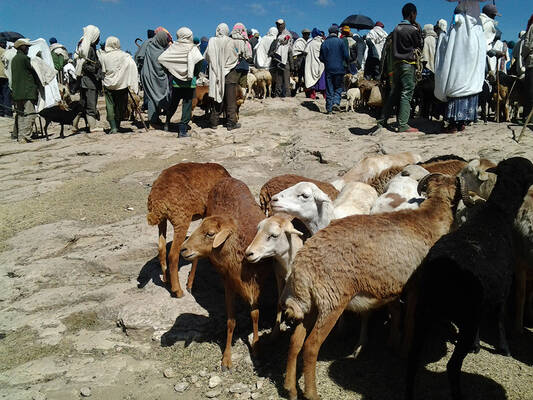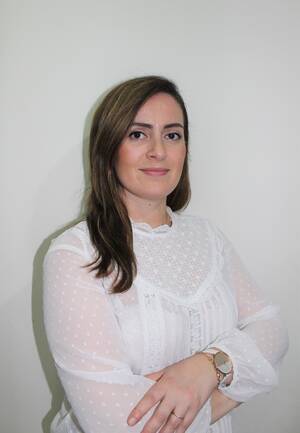Q&A with Mountaha Youssef

- Women in the field of science are underrepresented compared to their male peers. How do you explain the situation, and what are according to you the main changes that would reestablish balance?
Mountaha Youssef: I think many factors can explain the gender disparity between male and female scientists in the region where I work. I don’t think girls are encouraged enough to embrace scientific disciplines at a young age. That discriminatory mentality lingers even at a later stage which limits the number of women who want to study scientific specialties.
To reestablish balance, civil initiatives directed at women’s economic empowerment should be available, and more effort made to build confidence through trainings tailored for women to help them be comfortable in their new roles within their communities, or in society at large.
When it comes to research in the field of agriculture specifically, I believe many gender stereotypes exist because the field is more male-oriented, and traditionally responds better to the needs of male farmers and male researchers. In the field, this could be improved by raising awareness on how important it is for women to take on new roles across the value chain.
- In what ways has ICARDA supported you and your career?
MY: The organization supported me financially through my fellowship which was sponsored by ICARDA’s collaboration with the Arab Fund for economic and social development and enabled me to embark on a PhD. I was very lucky to do my PhD under the scientific supervision of Dr. Muhi El-Dine Hilali, who is a renowned livestock scientist at ICARDA in the field of fatty acids. He provided constant technical and experimental support for years while I was doing my research on fatty acids for my PhD. This really enhanced my knowledge and know-how as a young scientist. I defended my thesis in late July 2020.
- Is science becoming an increasingly neutral profession, in your opinion?
MY: Yes, I do believe that many efforts have been made to increase gender equity. However, it is progressing slowly, partly because the many obligations women have towards their families put us on a back foot from the start, and it is taking a long time for that to be fully understood by employers. In order to reach a high status as a scientist or as an academic, a quasi-total work commitment is required, of minimum 40 hours per week. So, women entering careers in science or engineering face more difficult trade-offs than most men.
- Globally, more women study science than men. However, fewer women work and remain in scientific professions than their male peers. Why is that according to you?
MY: As I said, professional responsibilities for women come in direct conflict with family obligations. I think that the workspacel is still not supportive enough of women, especially for those with young children or other caretaking responsibilities. As a result, some women just decide to not pursue the scientific career they were trained for at university.
The other problem is that generally, women still get paid less than their male colleagues in similar positions, which is not only unfortunate, but shameful quite frankly. The solution to incentivize women scientist to stay and grow as scientists would be to accommodate women’s family obligations through flexible working hours, affordable childcare facilities and nurseries, longer maternity leave or parental leave.
Why is it that only the mother leaves work for a period to care for her newborn? Fathers should also be encouraged to do the same.

- 2020 was clearly a hectic year for you. You defended your PhD thesis in the middle of a global pandemic, and you have small children. How has the pandemic impacted your work and productivity?
MY: I have three kids who are all under seven years old, and we have been at home together for most of the pandemic. Our house became a classroom and a playground, as well as an office for my husband and I.
The thing is that in non-pandemic times, my days are already filled with all sorts of responsibilities. With COVID-19, it doubled, especially on the children front. So, yes, my ability to publish has been affected, and I have been less productive which makes me feel very guilty. But I do not see how I can do anything differently.
- Many young women, in science and across all fields, suffer from low confidence levels. What could be done to improve their determination and boldness, according to you?
MY: It is true, girls and women often underestimate their abilities, especially in regards to careers in fields that are perceived as tough and masculine. This could be reversed through a support system of mentors, teachers, and peers. Parents also have a role to play in countering gender stereotypes. Schools could create spaces and trainings to boost girls’ empowerment and assertiveness, which would help them succeed as scientists in the future.
- I know that you are a young scientist, but would you have any advice a younger version of you starting her career in science?
MY: First, I would advise a younger me to accumulate a broad range of technical expertise and knowledge early on. I also would recommend to not postpone ambitious projects. I delayed my PhD studies for years after I got married and started having children, and studying with young kids is tough.
For a while, my family obligations took most of my time over my commitment to science. Because of this, finding time to fully immerse myself in my research and find the solution to important scientific questions, was much harder.
Do men have the same pressure I wonder? I don’t think so. But to me, the most important ingredient for a successful career is to have a real passion for science. Because it requires large amounts of perseverance, and ability to handle frustrations.
- What is the achievement in your career that you are the most proud of?
MY: Even with all the factors and pressures that I explained, I got my PhD degree. I know it would not have been possible without the fellowship and ICARDA’s support but even so, any women who has faced these barriers knows what I am talking about and I overcame them. That makes me very proud.

Mountaha Youssef got her diploma in agricultural engineering from the Lebanese University- faculty of Agricultural and Veterinary Sciences in 2008. She specialized in animal production and did her final project on Awassi sheep with Prof. Saab Abi Saab. Then she got a scholarship from IAMZCIHEAM to pursue her master studies in Animal Nutrition in Spain. She did her masters’ final project in 2011 with Prof. Gerardo Caja at the Autonomous University of Barcelona (UAB) on Lacaune and Manchego sheep. And just recently in July 2020 she got her PhD in Agricultural and Food Sciences from the Holy Spirit University (USEK) after having in 2017 a sponsored fellowship through a collaborative project between ICARDA collaborative project with the Arab Fund for Economic and Social Development (AFESD). The research project was supervised by Prof. Saab Abi Saab from USEK, with the joint collaboration of the Lebanese Agricultural Research Institute (LARI) represented by Dr. Michel Afram and ICARDA represented by Dr. Muhi ElDine Hilali. Her research activities at the milk department (LARI), where she works since 2012, focus on the determination of milk quality especially fatty acid profile in milk and milk byproducts such as cheese, as well as fat tail’s fatty acid profile of Awassi sheep. She attended many international conferences and participated in published papers.
